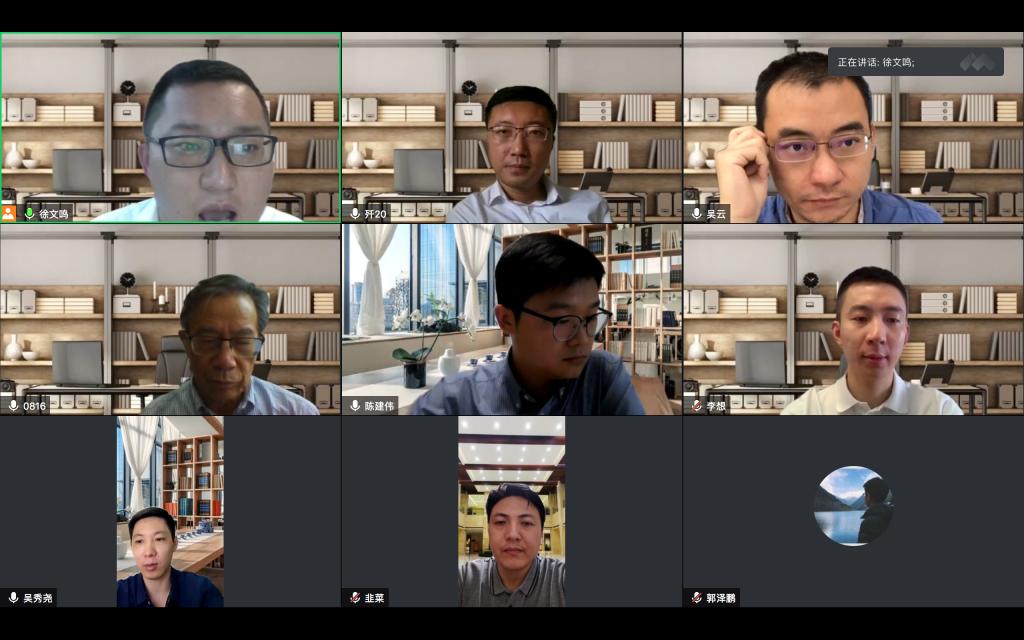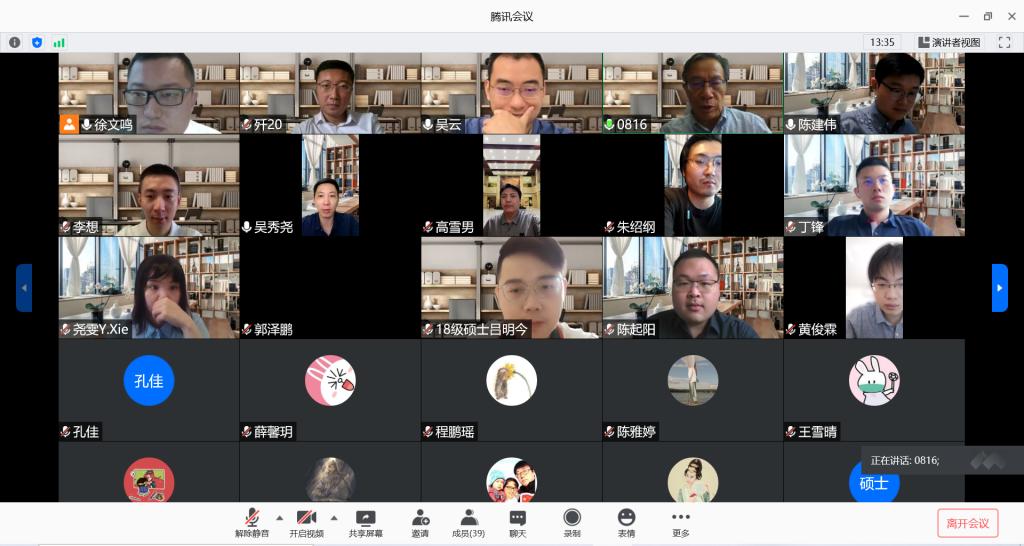On the morning of August 16, 2020, the Institute of Law and Economics held a seminar on "The Reform of China's Administrative Reconciliation System for Securities and Futures " in the Tencent Conference Room to discuss the objectives, practice, development and improvement of the system of securities administrative settlement in China based on the "Implementation Measures for Securities and Futures Administrative Settlement (Draft for Public Comments)" (hereinafter referred to as "Draft for Public Comments"). The seminar will discuss the objectives of China's securities administrative settlement system, its practice, development and improvement direction. Vice President Xu Wenming of the Institute of Law and Economics presided over the seminar, researcher Chen Jianwei of the China Financial Futures Exchange gave a keynote report, and Professor Xi Tao of the Institute of Law and Economics made a concluding commentary. The seminar was attended by the following experts: Hu Ting (working at Dalian Commodity Exchange, seconded to CSRC), Wu Yun (working at People's Bank of China Anti-Money Laundering Bureau), Shi Jin (working at National Small and Medium Enterprises Stock Transfer System), Wei David (working at Shanghai Stock Exchange), Hu Jianyu (working at China Guoxin Holdings Co. (Beijing Haiwen Law Firm), Gao Xuenan (Jiyin Financial Leasing Co., Ltd.), and Li Xiang (OK Virtual Currency Exchange).
President Xu Wenming firstly introduced the purpose of the seminar and the background of the promulgation of the "Implementation Measures for Securities and Futures Administrative Settlement (Draft for Public Comments)". The seminar aimed to use the exposure draft as a basis for discussion and to submit to the CSRC the Institute's recommendations on the improvement of the administrative settlement system for securities and futures.
Chen Jianwei, a researcher of China Financial Futures Exchange, gave a presentation entitled "Administrative Settlement of Securities and Futures: Deconstruction of Elements and Reconstruction of the System: A Review of the Implementation Measures for Administrative Settlement of Securities and Futures (Draft for Public Comments)>". Based on theoretical and empirical analysis, Researcher Chen Jianwei made the following three conclusions. Firstly, the Exposure Draft is worthy of affirmation because it makes liberal adjustments to the prerequisites for settlement and gives the administrative authorities the right to express their settlement intentions on their own initiative. Second, the draft still needs to be improved: setting up third-party review decisions; procedurally restraining the dominant position of administrative organs in law enforcement; generalizing the settlement interval and allowing the relief link to continue the settlement; expanding the form carrier for settlement, allowing the coexistence or mutual absorption of punishment and settlement in the same case; recognizing the remediability of administrative settlement and reasonably defining the scope of relief. Third, other issues worthy of attention include: information disclosure of settlement agreement; quantification of settlement amount; determination and compensation of investors' losses.
Next, the panelists spoke on the development of the settlement system in the Exposure Draft.
Ting Hu (who works at Dalian Commodity Futures Exchange and is seconded to CSRC) gave a presentation on the background and institutional positioning of the Exposure Draft. From a worldwide perspective, the institutional positioning of administrative settlement includes two kinds: firstly, as an important means to improve the efficiency of law enforcement and to exert law enforcement deterrence at less cost; secondly, as a complementary law enforcement approach. The former is represented by the U.S. model and the latter by the German model. 2019's newly amended Article 171 of the Securities Law can be interpreted as a shift from the German model to the U.S. model for China's securities settlement system, and the Draft for Public Comments is essentially guided by the concept of "administrative settlement as an important means to improve the efficiency of law enforcement". The Draft for Public Comments is in essence a design of the settlement system guided by the concept of "administrative settlement as an important means to improve the efficiency of law enforcement.
Wu Yun (working in the Anti-Money Laundering Bureau of the People's Bank of China) analyzed the original intention of the settlement system, the interface between administrative law enforcement and criminal justice, and made two suggestions on the scope of administrative settlement and the implementation of settlement agreements in the Draft for Public Comments. First, the content of administrative reconciliation should not be limited to administrative penalties, but can also be extended to urge correction, compliance arrangements, self-restrictions on operations, etc. Second, Article 23 of the Draft for Public Comments "the failure of the offending party to fulfill the settlement agreement is recorded in the integrity file database" has the problem of insufficient seriousness of the system, and it is necessary to It is necessary to restrain the application of the disciplinary system for breach of trust in the implementation of the settlement agreement, and the consequences of slack performance of the settlement agreement can be agreed in advance through the form of a contract, so as to realize the behavioral incentives for the counter-party to perform the agreement.
Shi Jin (who works for the National Small and Medium Enterprises Stock Transfer System) analyzes the reasons for the low number of settlement cases in current enforcement practice, the institutional advantages of settlement in eliminating "the negative impact of penalties on financing and mergers and acquisitions of listed companies", and how to implement the system of "settlement compensation for investors". The system implementation difficulties of "settlement compensation to investors".
Wei Dawei (who works at the Shanghai Stock Exchange) made two suggestions for improving the administrative settlement system for securities and futures. First, the system design should clarify the boundary between administrative penalties and administrative settlements on the basis of their institutional costs and benefits; second, whether investors need to be consulted or hearing procedures introduced for the determination of administrative settlements deserves further study.
Hu Jianyu (who works for China National New Holdings Co., Ltd.) believes that the issue of enforcement of administrative settlement agreements should be systematically refined. In the process of practice, it should be further clarified whether the administrative settlement agreement can be referred to the judicial authority for enforcement and whether the administrative authority can dissolve the administrative agreement if the parties refuse to execute the agreement.
Chen Qiyang (working in Shenzhen Stock Exchange) proposed three directions on the refinement of the administrative settlement system. First, whether the responsibility of securities administrative settlement can be allocated between the directors and supervisors of listed companies and the actual controllers; second, the interface between the existing compensation and administrative settlement system, and how to integrate the series of systems related to investor relief into one system is an important direction for system improvement; third, the interface between securities administrative settlement and securities representative litigation.
Ding Feng (working at Beijing Haiwen Law Firm) discussed the institutional benefits of securities administrative settlement and the enforcement of settlement agreements. Whether the settlement agreement is enforceable and whether the SEC and the court should establish a linkage mechanism to ensure the enforcement of the settlement agreement are issues that need to be addressed in the next phase of the system.
Gao Xuenan (working for Jiyin Financial Leasing Company, Ltd.) believes that the implementation rules of the system should focus on: the scope of application of administrative settlement should be further clarified; the criteria and methods of calculating investors' losses should be clearly determined; and the exercise of administrative privileges by administrative organs should be regulated and limited.
Li Xiang (working for OK Virtual Currency Exchange) suggests that administrative enforcement practice should expand the application of the settlement mechanism, taking into account the administrative settlement practice of the U.S. digital currency regulation. The current securities administrative settlement practice aims to improve the efficiency of law enforcement and protect investors. In the future, consideration can be given to incorporating a settlement enforcement system in the field of financial technology regulation to achieve the optimal balance of interests between "promoting technological innovation and protecting investors".
President Xu Wenming conducted a theoretical discussion on "the institutional function of securities administrative settlement, the realization of investor protection goals, and the institutional competition between securities administrative settlement and securities representative litigation". Firstly, the securities settlement system is applicable to some cases where the identification of facts and the application of law are difficult, which can save administrative costs to a certain extent; secondly, Article 21 of the Draft for Public Comments provides that investors can apply to the administrative settlement fund management agency for compensation, that is, investors need to apply for compensation on their own initiative, but in practice, it is difficult for victims of securities insider trading and market manipulation cases to know that they are victims. Therefore, the function of the administrative settlement system to protect investors needs to be strengthened; third, whether the administrative settlement agreement can be recognized as a precondition for securities representative litigation needs to be clarified, and there is some degree of institutional competition between the two.
Professor Xi Tao from the Institute of Law and Economics summarized the seminar. Professor Xi Tao affirmed the report of Researcher Chen Jianwei and made two suggestions on how the administrative settlement system can achieve the purpose of strengthening investor protection. Firstly, the procedure of settlement agreement signing and investor payout is fragmented, which is not conducive to investor protection, and further institutional construction is needed to realize the institutional connection of the two procedures. Secondly, the theoretical research and institutional practice of administrative settlement still need to be based on a full understanding of the extraterritorial system, combined with China's practice, and in-depth consideration of the theoretical and practical reform of securities administrative settlement.
The seminar was successfully concluded with the applause of everyone.

